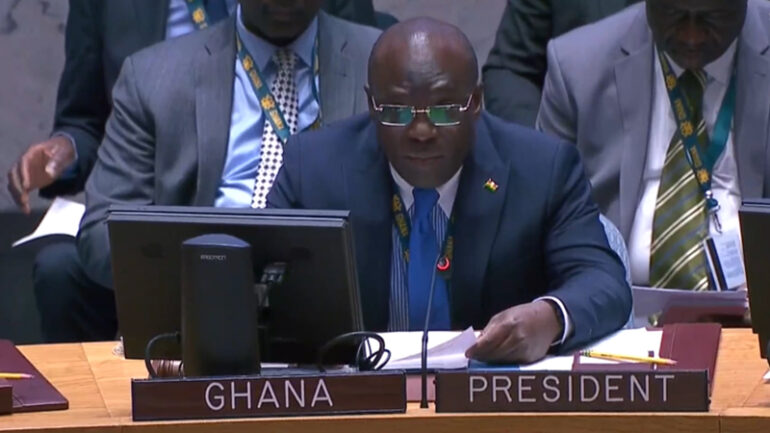Remarks at Briefing by UN Peacekeeping Operations by Police Commissioners

I thank USG Jean-Pierre Lacroix; Ms. Christine Fossen, Police Commissioner, UNMISS; Mr. Mody Berethe, Police Commissioner, MONUSCO; and Dr. Emma Birikorang, Deputy Director of Academic Affairs and Research, Kofi Annan International Peacekeeping Training Centre for their briefings to the Council this morning.
Colleagues:
We thank all police contributing countries for the sacrifices of their personnel, their commitment to peace and their continued effort in providing effective, efficient and accountable policing in many parts of the world. We also salute all police personnel who have made the ultimate sacrifice and lost their lives in the line of duty. May their sacrifice not be in vain. Since Ghana’s first police deployment to the Congo in the 1960s, our participation in several other missions has reinforced our confidence in the utility of UN policing. As the seventh largest troop and police contributing country (TPCC) presently, Ghana has seen at first hand the critical contribution of United Nations policing to the stabilisation of many conflict situations.
UN Police personnel have throughout the years helped to restore hope to distraught and displaced civilians, including women, children, and the aged, and provided confidence for fragile societies through intelligence-backed
surveillance, community policing, and the investigation of incidents of sexual and gender-based violence, human rights abuses, and other serious crimes. Even as present-day peacekeeping is complicated by the dangerous environment and challenging circumstances within which it must operate, UN policing becomes ever more critical. It is in this context that I make a few additional points that highlight the contribution of UNPOL to the realization of A4P+ priorities, and emerging challenges to peacekeeping. First, we welcome the sustained engagement and commitment by the Department of Peace Operations and field missions to ensure accountability for crimes against peacekeepers. Despite consistent mobilization as well as the adoption of Security Council resolution 2589 (2021), accountability to peacekeepers remains relatively low compared to the growing number of violent incidents against peacekeepers. We must therefore be resolute in working with host countries to demand accountability for crimes against peacekeepers, including in the Central Africa Republic, the Democratic Republic of Congo,
and in Mali.
Second, we encourage the further deployment of innovative technological solutions, which addresses the challenges of peacekeeping and remains critical to supporting mandate implementation. We are happy with the work that is going on with the Unite Aware platform, which continues to build on the capabilities rolled-out in MINUSCA in the Central African Republic and is now being used to enable situational awareness for medical support and engage in radio mining and video data analysis. We also commend the ongoing assessments of the DPO on the nature of the threat that misinformation and disinformation pose to the missions and how missions have been countering this threat with the use of strategic communications.
Third, we encourage the further implementation by UNPOL and the Department of Operational Support of the Women, Peace and Security agenda and its priorities to ensure full, equal, and meaningful participation of women in
all stages of the peace process and by systematically integrating a gender perspective into analysis, planning, implementation, and reporting. Admittedly, there is much more that needs to be done to achieve the targets, but the progress is steady and must be sustained.
Lastly, peacekeepers are accountable. We therefore support UNPOL’s efforts to improve evidence-based assessments of performance and to ensure adherence to standards of conduct by reinforcing zero tolerance for sexual exploitation and abuse.
In conclusion, Ghana endorses the approaches for the establishment and maintenance of strong partnerships with national counterparts and communities, including civil society and women’s networks for meaningful cooperation with host governments and communities, as well as the identification and implementation of shared political strategies and agreements to address the emerging threats to peace and security.
We also encourage the important role of UN peacekeepers in environmental management of the host country and mandated missions as well as the intensification of efforts aimed at reducing the overall environmental footprint of Peacekeeping Operations as per General Assembly Resolution 76/274 (2022).
I thank you.
